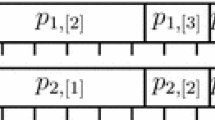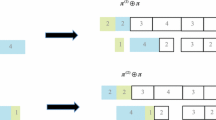Abstract
We show by induction that the shortest processing time sequence is optimal for a number of three-stage ordered flow shops with either synchronous flow, blocking or no-idle machines, effectively proving the optimality of an index priority rule when the adjacent job pairwise interchange argument does not hold. We also show that when the middle machine is maximal, the synchronous flow, blocking and no-wait problems are equivalent, because they can be effectively decomposed into two equivalent two-stage problems. A similar equivalence is shown for the classical flow shop and the flow shop with no-idle machines. These equivalences facilitate the solution of one problem by using the optimal algorithm for the equivalent problem. Finally, we observe that when the middle machine is minimal, the optimal sequence is not a pyramid sequence for the synchronous flow and blocking flow shops. On the other hand, we show that the optimal sequence for the flow shop with no-idle machines is a pyramid sequence obtainable by dynamic programming in pseudo-polynomial time.






Similar content being viewed by others
References
Adiri, I., & Pohoryles, D. (1982). Flow-shop/no-idle or no-wait scheduling to minimize the sum of completion times. Naval Research Logistics Quarterly,29, 495–504.
Allahverdi, A. (2016). A survey of scheduling problems with no-wait in process. European Journal of Operational Research,255, 665–686.
Arora, R. K., & Rana, S. R. (1980). Scheduling in a semi-ordered flow shop without intermediate queues. AIIE Trans,12, 263–272.
Axsater, S. (1982). On scheduling in a semi-ordered flow shop without intermediate queues. IIE Trans,14, 128–130.
Ding, J. Y., Song, S., Gupta, J. N., Wang, C., Zhang, R., & Wu, C. (2016). New block properties for flow shop scheduling with blocking and their application in an iterated greedy algorithm. International Journal of Production Research,54(16), 4759–4772.
Elmaghraby, S. E. (1968). The one machine sequencing problem with delay costs. Journal of Industrial Engineering,19, 105–108.
Emmons, H., & Vairaktarakis, G. (2012). Flow shop scheduling: Theoretical results, algorithms, and application. Berlin: Springer.
Goncharov, Y., & Sevastyanov, S. (2009). The flow shop problem with no-idle constraints: A review and approximation. European Journal of Operational Research,196, 450–456.
Hall, N. G., & Sriskandarajah, C. (1996). A survey of machine scheduling problems with blocking and no-wait in process. Operations Research,44, 510–525.
Hoo, S., & Hoogeveen, H. (2003). The three-machine proportionate flow shop problem with unequal machine speeds. Operations Research Letters,31, 225–231.
Johnson, S. M. (1954). Optimal two and three stage production schedules with setup times included. Naval Research Logistics Quarterly,1, 61–68.
Kalczynski, P. J., & Kamburowski, J. (2007). On no-wait and no-idle flow shops with makespan criterion. European Journal of Operational Research,178, 677–685.
Panwalkar, S. S., Smith, M. L., & Koulamas, C. (2013). Review of the ordered and proportionate flow shop scheduling research. Naval Research Logistics (NRL),60(1), 46–55.
Panwalkar, S. S., & Woollam, C. R. (1979). Flow shop scheduling problems with no in-process waiting: a special case. Journal of the Operational Research Society,30, 661–664.
Potts, C. N., & Strusevich, V. A. (2009). Fifty years of scheduling: A survey of milestones. Journal of the Operational Research Society,60, 541–568.
Smith, M. L., Panwalkar, S. S., & Dudek, R. A. (1975). Flow shop sequencing with ordered processing time matrices. Management Science,21, 544–549.
Smith, M. L., Panwalkar, S. S., & Dudek, R. A. (1976). Flow shop sequencing with ordered processing time matrices—A general case. Naval Research Logistics Quarterly,23, 481–486.
Soylu, B., Kica, O., & Azizoglu, M. (2007). Flow shop-sequencing problem with synchronous transfers and makespan minimization. International Journal of Production Research,45, 3311–3331.
Waldherr, S., & Knust, S. (2015). Complexity results for flow shop problems with synchronous movement. European Journal of Operational Research,242, 34–44.
Acknowledgements
We want to thank the reviewers, whose valuable critique helped us achieve greater clarity in the final version of the paper.
Author information
Authors and Affiliations
Corresponding author
Additional information
Publisher's Note
Springer Nature remains neutral with regard to jurisdictional claims in published maps and institutional affiliations.
Rights and permissions
About this article
Cite this article
Panwalkar, S.S., Koulamas, C. Three-stage ordered flow shops with either synchronous flow, blocking or no-idle machines. J Sched 23, 145–154 (2020). https://doi.org/10.1007/s10951-019-00618-6
Published:
Issue Date:
DOI: https://doi.org/10.1007/s10951-019-00618-6




